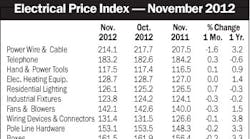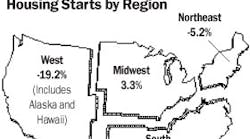The Securities and Exchange Commission (SEC) accused six former Anicom executives of inflating revenues by $38 million at what was one of the largest wire and cable specialists in the United States.
On May 6, the SEC filed a civil lawsuit against six former Anicom Inc. officials, including its chief executive and president. The suit alleges that the executives and other employees carried out a “massive financial fraud” at the now-bankrupt company. In the suit, filed in federal court in Chicago, the SEC alleged that from Jan. 1, 1998, to March 30, 2000, the defendants allegedly falsely reported millions of dollars of non-existent sales, including sales to a fictitious customer, and allegedly used other fraudulent techniques to inflate Anicom's revenues by more than $38 million and net income by more than $20 million.
The SEC said when aspects of the alleged fraud were revealed to the public, Anicom's shareholders lost more than $80 million.
The former executives named in the lawsuit are President and Chief Executive Officer Carl Putnam, Chief Financial Officer Donald Welchko, Chief Operating Officer John Figurelli, Vice President of Sales Daryl Spinell, Vice President of Accounting Ronald Bandyk and Renee LeVault, who managed Anicom's billing department.
The SEC also alleged that Putnam and Welchko misled two investigations of improper sales at Anicom. In October 1999, Putnam and Welchko allegedly directed an employee to lie about his knowledge of improper sales during an internal investigation into allegations of sales misconduct. Two months later the SEC requested information relating to sales credits issued in 1999, but an employee alledgedly was instructed to compile the data without all sales credits relating to a fictitious customer called SCl Integration.
The alleged fictious client was used to improperly recognize more than $11.7 million in sales, aimed at minimizing the effect on income of writing off earlier improper sales, the SEC said.
Welchko and Bandyk were also accused of entering journal entries that led to improper charges of certain expenses to a reserve account.
When contacted by EM, attorneys for two of the defendants denied the charges. John Falvey of Testa, Hurwitz & Thibeault, Boston, an attorney for Carl Putnam, said Putnam “completely denies” that he was engaged in any fraud or wrongdoing. “The scheme he's alleged to have participated in makes no sense when he did not trade any of the stock that he holds in Anicom. It's unthinkable why anyone would engage in the kind of scheme that is being described in that complaint and not seek to profit from it. He looks forward to having the chance to clear his name in this matter.”
An attorney for Donald Welchko said that the allegations against Welchko were unfounded. “He never intended to deceive any Anicom investor,” said Leo P. Cunningham of Wilson Sonsini Goodrich & Rosati, Palo Alto, Calif. “He himself was an Anicom investor and he lost money on Anicom stock. The complaint makes no sense in that while it appears to allege that someone was trying to increase the price of Anicom stock, it makes no sense for Mr. Welchko to have done that in as much as he never sold any stock. We think that when the case is over, Mr. Welchko will be vindicated.”
Attorneys representing the other defendants could not be reached for comment.

